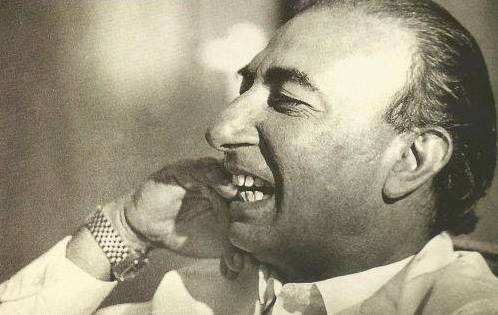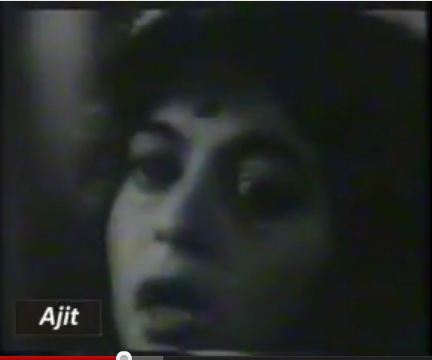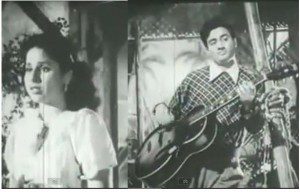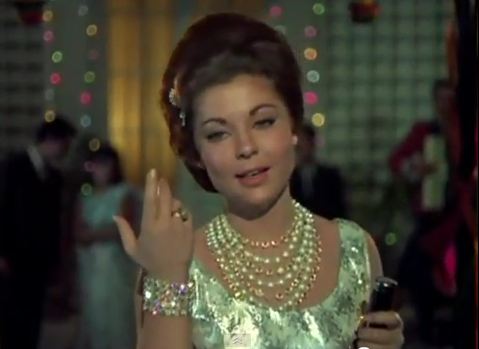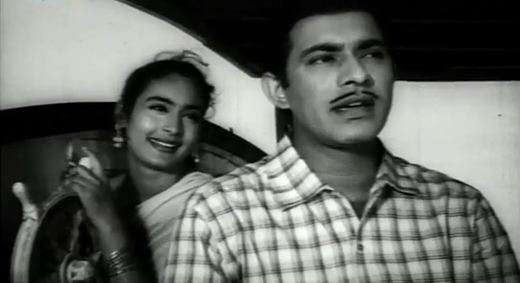I had always intended to start off this series (The Masters) with a post on this prolific poet. My instinctive reaction to a song is not to its music, though that matters a lot, but to its lyrics. It is the sentiments that the words express that call to me. More often than not, however, a song is known because of the singer; not the composer or the lyricist. In fact, it was Sahir who fought with All India Radio for the right of lyricists to be credited for a song, along with the singers and composers.
Born Abdul Hayee in Ludhiana in 1921, Sahir Ludhianvi once mentioned how his takhallus or nom-de-plume came about in a radio programme. He had read poet Allama Iqbal‘s couplet:
Is chaman mein honge paida bulbul-e-shiraaz bhi,
Sainkdon saahir bhi honge saahib-e-eijaaz bhi
– and picked ‘Sahir‘ (magician) as his pseudonym. An apt name, considering the magic he was to weave with his pen.
Born to a feudal family, Sahir’s childhood was nevertheless clouded by fear and penury. His father re-married, several times, and his mother finally took the bold step of leaving her husband and foregoing all financial assistance to raise his only son. Her husband sued for custody of his only son, lost, and threatened to kill his ex-wife and child, if only to ensure that the boy did not live with his mother. This fear and sense of loss was to stay with him right through his life; his failed romances with first a classmate, and then with poet Amrita Pritam and singer Sudha Malhotra would only exacerbate his loneliness. But this sorrow was to also influence his poetry.
His romance with Amrita Pritam was possibly the most intense, the flame burning brightly at both ends. In her autobiography (Raseedi Ticket), Amrita was to write:
Aur mujhe lagta hai
ki shamshan ki aag, aag ka apmaan hai
Kisi Sohni, Sassi ya Heer mein
Jo aag jalti thi
Mujhe us aag ki pehchaan hai
(I think the fires that light the cremation grounds are an insult to the flame; I only recognise the fires that burnt in Sohni, Sassi or Heer.)
Sahir never moved far from his preoccupation with romanticism. In his own words:
Mere sarkash taraane sun ke duniyaa ye samajhti hai
ke shaayad mere dil ko ishq ke naghmon se nafrat hai
(Hearing my revolutionary songs, the world assumes that perhaps my heart hates the melody of love)
Magar ae kaash dekhein vo meri pursoz raaton ko
Main jab taaron pe nazren gaadkar aansu bahaata hoon
(If only they would glimpse my tear-filled nights when I fix my gaze on the stars and weep)
Amrita and he met and spent hours together without talking; when Sahir left, she would hurriedly smoke the cigarette butts he left behind, hoping the smoke would mingle with the air and meet up with him in the heavens. Sahir once invited her and her much younger partner Imroz to meet him in a hotel room. They ordered whiskey, sat and talked for a long time.
At midnight, Amrita received a call from Sahir. “There are still three glasses lying on the table, and by turn I am sipping from each of them, and writing Mere Saathi Khaali Jaam.” However, his relationship with her was never destined to be. Neither was his relationship with Sudha Malhotra, whose father objected on account that Sahir was Muslim. Perhaps it was his failed romances that lined his poetry with disillusionment as he wrote:
Bichchad gaya har saathi de kar, pal do pal ka saath
Kisko fursat hai jo thaame deewanon ka haath
Humko apna saaya tak, aksar bezaar mila
Humne to jab kaliyan maangi, kaaton ka haar mila
The joy of romance and the bitterness of its aftermath, the cynicism and the socialist fervour, the voice of revolt, and his empathy with the common man’s struggles were voices from his own personal experiences. As he wrote in Talkhiyaan (Bitterness / Bitter Words):
Duniya ne tajrubaat o hawaadis ki shakl mein
Jo kuch mujhe diya hai, wo lauta raha hoon main
Sahir Ludhianvi made his debut as a lyricist with Badal rahi hai zindagi (and three others) from Azaadi ke Raah Par (1949). Both the film and the songs went unnoticed. It would be 1951 before he would taste success. He had been signed for Navketan’s second film – Baazi. It was a make-or-break venture for several people. The fledgling Navketan banner’s debut offering Afsar(1950) had flopped badly. They needed a hit if the production house was to stay afloat. It was Guru Dutt‘s first venture as a director. However, before Baazi was completed, Naujawan, another SD Burman – Sahir Ludhianvi collaboration released, bringing Sahir into the limelight with Thandi hawaayein lehraake aaye becoming very popular. Baazi cemented that success.
As happened before with Salil Choudhary, I will confess that to choose just a handful of songs from this inimitable poet’s repertoire is a humbling task. So, as always, this is a very subjective list; while my favourite songs can, and do, change with my mood, the following songs (in no particular order) will always remain perennial favourites.
1) Chaand madham hai aasman chhup hain (Railway Platform 1955) Lata Mangeshkar, M.D. Madan Mohan
This film saw the debut of a young man named Balraj Dutt, more popularly known by his screen name, Sunil Dutt opposite Nalni Jaywant and Sheila Ramani. Chand madham hai was originally a nazm titled Intezaar (waiting). Sahir used it in the film where the heroine’s anguish was brought to life beautifully by Madan Mohan’s melody and Lata’s voice.
In bahaaron ke saaye mein aa jaa
Phir muhabbat jawaan rahe na rahe
Zindagi tere naamuraadon par
Kal talak meharbaan rahe na rahe
Her plaint is piteous indeed as she waits, and waits…
2) Yeh raat yeh chaandni phir kahan (Jaal 1952) Hemant Kumar, M.D. SD Burman
This song has been a favourite for many, many years, for many reasons. That is why it made its appearance in a couple of other lists. It still gives me the goosebumps whenever I hear it. It is also interesting that while the song is a male solo, the camera rests lovingly on the heroine’s face, chronicling the tumult within her breast as she struggles with her love for a man she knows is not right for her.
As he sings
Is haseen aag mein tu bhi jal ke dekh le,
Zindagi ki betukhi tu badalke dekh le,
Sun le ab dil ki dhadkano ki zubaan,
Sun jaa dil ki dastaan…
…the storm outside is nothing compared to her inner turmoil. The lyrics were sensuous without being vulgar.
3) Sansar se bhage phirte ho (Chitralekha) Lata Mangeshkar, M.D. Roshan 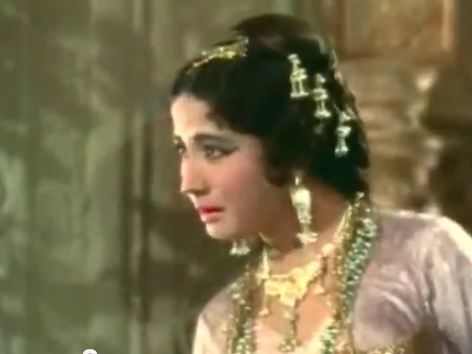
When Aryagupt Samant Bijgupt, besotted by the court danseuse Chitralekha, refuses to marry Princess Yashodhara, her father sends Rajguru Kumargiri to convince Chitralekha to give him up. When he commands her to give up her ‘sinful’ lifestyle so she can attain nirvana, she hears his sermon, and mocks him.
Sansar se bhaage phirte ho
Bhagwan ko tum kya paaoge
Is lok ko bhi apna na sake
Us lok mein bhi pachtaaoge
As Kumargiri leaves, disgusted with her hedonistic lifestyle, and annoyed at what he considers her temerity at questioning him, she, made cynical by the ways of the world, berates its hypocrisy:
Yeh paap hai kya yeh puny hai kya
Reeton par dharm ke mohre hain
Har yug mein badalte dharmon ko
Kaise aadarsh banaaoge?
Sahir, who hitherto had been known as an Urdu poet, gave lyrics in Hindi for this film, proving that he was as proficient in either language.
4) Tum apna ranjh-o-gham (Shagoon 1964) Jagjit Kaur, M.D. Khayyam 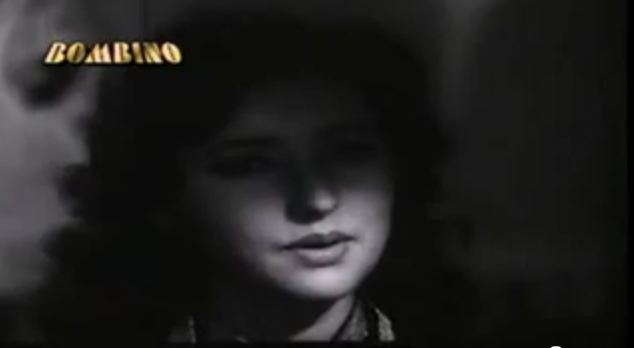
From cynicism to pure romance. I have lost sight of the films that I have seen because I fell in love with the songs, and was left to rue the fact that the movies should never have been made! This Waheeda Rehman-Kamaljeet vehicle was one such. However, I love this song! If there ever was a song that expressed such unconditional love, such empathy for a loved one, it has to be this – to ask to share his sorrows, to plead with him to give them to her…
Tum apna ranjh-o-gham apni pareshaani mujhe de do…
…even when the man you love, is in love with someone else.
Vo dil jo maine maanga tha magar gairon ne paaya hai
Is dil ki pashemani mujhe de do
5) Jinhe naaz hai hind par woh kahaan hai(Pyaasa 1957) Mohammed Rafi, M.D. SD Burman 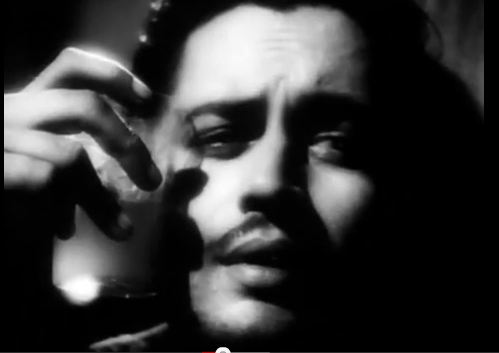
The songs from this film were quintessential Sahir – cynical and outspoken. Adapted from his Chakley (Brothels), he simplified the verses for the film. A bitter denunciation of the exploitation of women by the keepers of society’s morality, it seemed that Vijay, the disillusioned protagonist of the film was Sahir’s alter ego, giving voice to his anguish.
Woh ujle dareechon mein paayal ki chhan-chhan
Thaki haari saanson pe table ki dhan-dhan
Ye be-rooh kamron mein khaansi ki than-than
Jinhe naaz hai hind par woh kahaan hain
He ends with a strident call for them to accept their responsibilities:
Zara mulk ke rehbaron ko bulaao
Ye kuuche ye galiyaan ye manzar dikhaao
Jinhen naaz hai hind par unko laao
Jinhe naaz hai hind par woh kahaan hain?
Just a hint of music that does not overshadow Rafi’s voice – lovely. Unfortunately, Pyaasa was to see the end of Sahir’s successful collaboration with SD Burman. It is said that Burmanda was displeased at Sahir’s lyrics gaining more appreciation than the music of the film; others claim that it was Sahir’s arrogance in proclaiming that a lyricist was more important than a composer. Whatever the reason, the two men never worked together again.
6) Cheeno-arab tumhara (Phir Subah Hogi 1958) Mukesh, M.D. Khayyam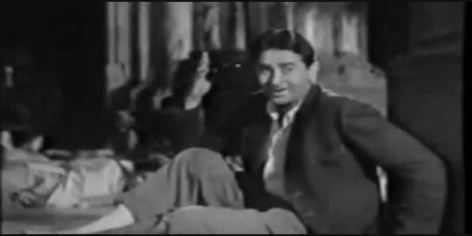
Based on Dostoevsky‘s Crime and Punishment, it was Sahir’s insistence that the music director of the film must have read the book that led to Khayyam being signed in place of Raj Kapoor’s favourites – Shankar-Jaikishen. Sahir parodied Iqbal’s famous Saare jahan se achcha from his Tarana-e-mili and then, borrowing verses from his Tarana-e-Hind, Sahir made a mockery of them too, giving trenchant voice to his disgust with Nehruvian socialism.
Taalim hai adhuri, milti nahin majoori
Maloom kya kisi ko, dard-e-nihaan hamara
Chin-o- arab hamara, hindustan hamara
Rehne ko ghar nahin hai, saara jahaan hamara
This song was an anthem of the disillusioned, educated, unemployed youth who, in their idealism, still believed that their country would provide for them. Controversial as the lyrics were, there was talk of the song being banned at one time.
It ended on a dawning note of hope, however; a hope that tomorrow will bring with it a better future.
Patla hai haal apna, lekin lahu hai gaadha
Faulad se bana hai, har naujawaan hamara
Mil-jhul ke is vatan ko, aisa sajaayenge hum
Hairat se munh takega, saara jahaan hamara
7) Aurat ne janam diya mardon ko (Sadhna 1958) Lata Mangeshkar MD: N Dutta
This song has been a favourite from my teenage years, long before I saw the film. Sahir pulls out all stops here as he brutally holds a mirror to the hypocrisy and double standards that exist in society.
Yeh woh be-izzat cheez hai jo
Bant jaati hai izzatdaaron mein
What is frightening is that his lyrics are as true today, as they were half a century ago.
Mardon ke liye har zulm rawa
Aurat ke liye rona bhi khata
Mardon ke liye laakhon sejein
Aurat ke liye bas ek chita
Mardon ke liye har aish ka haq
Aurat ke liye jeena bhi saza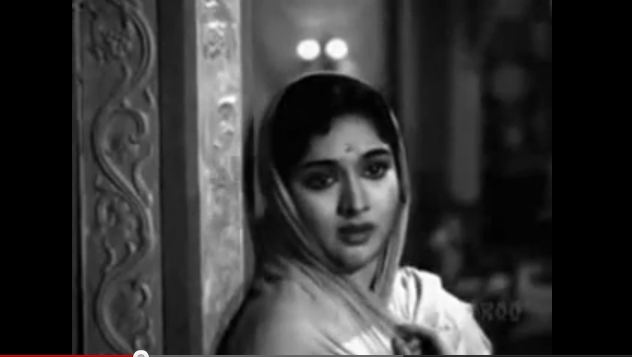
This is not the most enjoyable of songs, because of the disturbing lyrics.
Mardon ne banaayeen jo rasmein
Unko haq ka farmaan kaha
Aurat ke zinda jalne ko
Qurbaani aur balidaan kaha
Ismat ke badley roti di
Aur usko bhi ehsaan kaha
Sahir doesn’t pull his punches as he leaves you with the horrifying image of an unfortunate mother, bedded against her will by her own son.
Ye woh badkismat maa hai jo
Beton ki sej pe leti hai
8) Khuda-e-bartar ae zameen par (Taj Mahal 1963) Lata Mangeshkar, M.D. Roshan
Not as well-known as his Allah tero naam, the lyrics of this lesser-known plaint against the futility of war still resonates today in a world torn apart by strife and bloodshed.
Khuda-e-bartar teri zameen par,
Zameen ki khaatir ye jang kyon hai
Har ek fatah-o-zafar ke daaman pe
Khoon-e-insaan ka rang kyon hai
As the men leave to fight the wars, it’s the women who are left behind, their mothers, sisters, wives who wonder whether war is ever an answer, and who plead for sanity and reason. 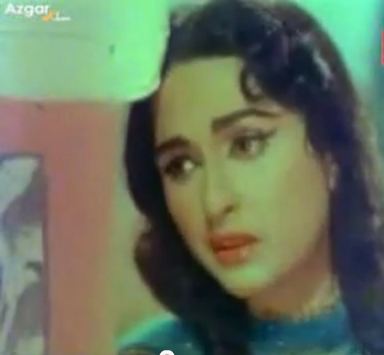
And Arjumand Begum prays for the safe return of Prince Khurram and his men.
Qaza ke raste pe jaanevaalon ko
Bach ke aane ki raah dena
Dilon ke gulshan ujad na jaaye,
Muhabbaton ko panaah dena…
It is interesting that Sahir was only 19 when he courted controversy by penning a satirical poem titled Taj Mahal, which he recited at a college function to much pandemonium:
Ek shahenshah ne daulat ka sahara lekar
Hum gareebon ki muhabbat ka udaaya hai mazaaq
9) Tum mujhe bhool bhi jao (Didi 1959) Sudha Malhotra-Mukesh MD: Sudha Malhotra
This was the only song that was composed by Sudha Malhotra in this film, the rest being scored by N Dutta. It is said that Sahir’s lyrics were reflective of their relationship. Every word of it will resonate with anyone who has ever suffered the pangs of unrequited love.
Tum mujhe bhool bhi jao to ye haq hai tumko
Meri baat aur kai maine muhabbat ki hai
Who, loving, has not wondered:
Mere dil ki mere jazbaat ki keemat kya hai
Uljhe-uljhe se khayalaat ki keemat kya hai
But how could the man intersperse the incredible joys of loving and the devastating grief of separation with such hard-nosed practicality that is the male part of the duet? (aargh!)
Zindagi sirf muhabbat nahin kuch aur bhi hai
Zulf-o-rukhsaar ki jannat nahin kuch aur bhi hai
Bhook aur pyaas ki maari huyi is duniya mein
Ishq hi ek haqeeqat nahin kuch aur bhi hai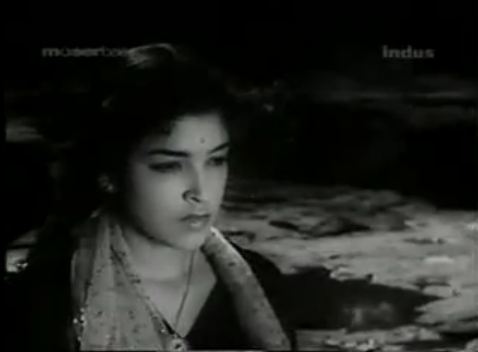
And then I wonder if it underscores the difference between man and woman, because she sings:
Tumko duniya ke gham-o-dard se fursat na sahi
Sabse ulfat sahi mujhse hi muhabbat na sahi
Main tumhari hoon yahi mere liye kya kam hai
Tum mere hoke raho ye meri kismat na sahi
Years later, when Sahir ran into the newly-wed Sudha at a party, he’s said to have spontaneously recited Chalo ik baar phir se ajnabi ban jaaye hum dono. He later used those verses for BR Chopra’s Gumraah, for two lovers who are doomed to never forget their love, but whose passion can never be fulfilled.
10) Aage bhi jaane na tu (Waqt 1965) Asha Bhosle, M.D. Ravi
The first song in this film, Waqt se din aur raat, sees a family destroyed by the vagaries of nature, and separated by the fates. Many years later, the now-grown-up children cross paths again, ignorant of their relationship to each other. By the time Aage bhi… winds to an end, a necklace is stolen, a man is murdered, one brother is accused, and another stands eyewitness to the killing. Soon, the third brother will have to prove his sibling’s innocence.
This is probably out of place in the songs I have listed so far. However, it is a song that I love, for the fatalism implicit in its philosophy. Carpe Diem – seize the day, the moment, live in the present, kal ho na ho?
Is pal ke saaye mein apna thikana hai
Is pal ke aage ki har shay fasana hai
Kal kisne dekha hai kal kisne jaana hai
Is pal se paayega jo tujhko paana hai
Jeenewaale soch le
Yahi waqt hai kar le poori aarzoo
11) Pyar par bas to nahin hai(Sone ki Chidiya 1958) Talat Mahmood-Asha Bhosle MD: OP Nayyar
Sahir’s lyrics were not typical of the romantic poetry of the day. However, he had a strong vein of romance in him, and in this, one of his most sensitive songs, there is a hesitancy, a reservation that he expresses – does the woman love him? ‘Tell me,’ he says
Mere khwaabon ke jharokhon ko sajaane waalo
Tere khwaabon mein kahin mera guzar hai ke nahin
Poochkar apni nigaahon se bata de mujhko
Meri raaton ke muqaddar mein sahar hai ke nahin
He needs her, and he is frightened of that need.
Ki aisa na ho pao mere tharra na jaaye
Aur teri marmari baahon ka sahaara na mile
Ashq behte rahe khamosh siyaah raaton mein
Aur tere reshmi aanchal ka kinara na mile
12) Tu Hindu banega na Mussalman banega (Dhool ka Phool 1959) Mohammed Rafi, M.D. N Dutta
A bold movie for those times, Dhool ka Phool dealt with the issue of premarital sex, and an unwed mother who has no other option but to abandon her newborn baby. Brought up by a kind-hearted Muslim, the boy is damned by society for being illegitimate, and faces all the prejudices that underline such a birth. On the principle that there are no illegitimate children, only illegitimate parents, the kind foster father hopes to inculcate a sense of humanity in the innocent child (Insaan ki aulad hai, insaan banega); one that is not tainted by the biases of religion or the hypocrisy of society.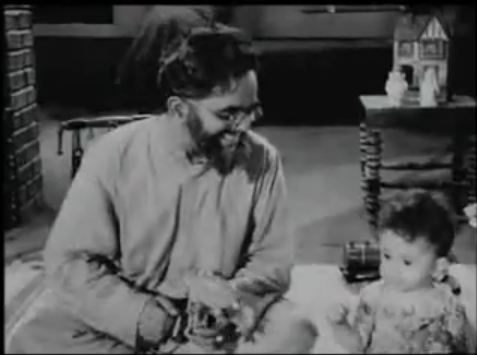
Maalik ne har insaan ko insaan banaya
Humne use Hindu ya Mussalman banaya
Kudrat ne to bakshi thi hamein ek hi dharti
Humne kahin Bharat kahin Iran banaya
So, thank you, SahirSaab, wherever you are, for some of the most evocative lyrics that have ever been penned. Your words –
Kal koyi mujhko yaad kare
Kyun koyi mujhko yaad kare
Maghroor zamaana mere liye
Kyun waqt apna barbaad kare
– do not hold true for you. For as long as old Hindi songs continue to mesmerise newer generations, as long as music lives on, you will never be forgotten.
Written By:- Anuradha Warrier, is a writer, editor, film and music buff. She writes for pleasure, edits for a living, and indulges in watching films, listening to music, and writing about both on her blog Conversations Over Chai as and when time permits.
Caution: The opinion expressed in this article are the personal opinion of the author. Bollywoodirect is not responsible for accuracy, completeness, suitability or validity of any information in this article. The information/Opinion, facts appearing in it do not reflect the views of Bollywoodirect & Bollywoodirect doesn’t assume any responsibility or liability of the same.

